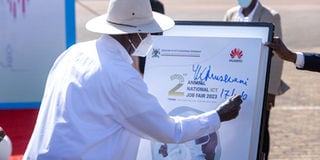Prime
ICT Job Fair exposes 10,000 youth to potential employers

President Museveni, who was the Chief Guest, signing National ICT Job Fair, 2023 board on Tuesday, October 17, 2023, at Kololo Ceremonial Ground. Photo | PPU
What you need to know:
- Meanwhile it has emerged that only 97 per cent of youth use ICT in Uganda to better themselves
Chinese tech giant Huawei Technologies has for the second time in as many years partnered with the government to expose estimated 10,000 young people to potential employers in the ICT sector in an effort to address the unemployment question.
For the second year running Huawei remains the main partner and sponsor of the annual ICT Job Fair being held at Kololo Ceremonial Grounds. The two-day event, ending today (Wednesday) aims at addressing the youth unemployment question in Uganda through the ICT sector.
Given the potential of ICT across the economic sectors, Huawei Technologies Uganda in partnership with the Ministry of ICT and National Guidance are both of the view that the ICT Job fair, 2023 provides a perfect platform for the youth to directly connect with employers while at the same time uncover employment opportunities.
According to the Permanent Secretary at the Ministry of ICT and National Guidance, Dr. Aminah Zawedde, the Second National ICT Job Fair is “a one-of-a-kind event filled with opportunities for employment, internships, ICT skilling, and training for all.”
She said ICT services in Uganda continued to grow at an average growth rate of 14.8 percent. According to the ministry statistics, ICT sector value added increased to Shs 2.9 trillion in FY2020/21 up from Shs 2.7 trillion in FY2019/20.
The National Labour Force Survey also indicates that 42.9 per cent of those who do find employment have the necessary education for their jobs, while 46 per cent are undereducated for their positions. This, according to Dr Zawedde underscores the importance of job-relevant skilling, especially in sectors like ICT.
Although slightly majority of the youth have access to ICT equipment such as radios, telephones, and tablets, Dr Zawedde while quoting sector statistics, reveals that about 97 per cent “of our youth primarily use ICT for social networking, with only 32 per cent using it for academic purposes and a mere 10 per cent use it to explore online job opportunities.
The Ministry of ICT, she said is committed to addressing these pressing challenges through strategic initiatives like Business Process Outsourcing (BPO) and National Skilling Program.
Speaking at the ICT Job Fair, 2023 launched on October 17, where President Yoweri Kaguta Museveni was the Chief Guest, the Huawei Uganda Managing Director, Mr Sunrise, said the previous ICT industry JOB Fair held at Makerere University exposed young people to more than 1,000 job opportunities, some of whom ended up as full time employee with Chinese tech giant.
It emerged from both the government and ICT industry players that his time round, at least 10,000 youth will be exposed to different opportunities in the sector during the course of Fair.
“This year we will continue to offer 15 more internship opportunities,” says Mr Sunrise, adding, “We will also provide 500 advanced ICT technologies training for free to the youth who registers with us at this Job Fair.”
According to Mr Sunrise ICT can significantly contributes to Uganda's economic development and people's well-being.
President Museveni in his remarks commended Huawei, saying his invitation in the early 2000s for Huawei to set up shop in Uganda has paid off.
The President said that ICT has supported the transformation of Uganda, noting that: “Digital innovation is making things more efficient, faster while enabling traceability.”
And it is for this reasons that he supports the idea of digitising government processes.
Utility
- Uganda’s 4G population coverage is however only 31%, which is below the African average of 50%. Kenya, Rwanda, and Tanzania are at 94%, 98%, and 13% respectively. The Digital Uganda Vision (DUV) target is 50% 4G coverage.
- Only 10% of Ugandans use the Internet in Uganda, well below the DUV target of at least 50% by 2020. Kenya, Rwanda, and Tanzania are at 29%, 30%, and 32% respectively. The African average is 40%.
- Only about 15% of Ugandans have smart phones, an essential tool for exploiting the broadband opportunity in all aspects of personal and national economic development. Kenya, Rwanda and Tanzania are at 41%, 15% and 30% respectively, while in South Africa it is 60%.
- Ugandans spend 8% of their average monthly income on a 2GB data-only monthly mobile bundle. This is the highest proportion in the EAC (except for Burundi at 13.7%) and much higher than the Broadband Commission affordability target of 2%.
- Ugandans primarily acquire digital skills in higher education.
- 70% of urban areas have access to electricity compared to 33% of rural areas, increasing the cost of delivery of broadband services and therefore cost to users.





